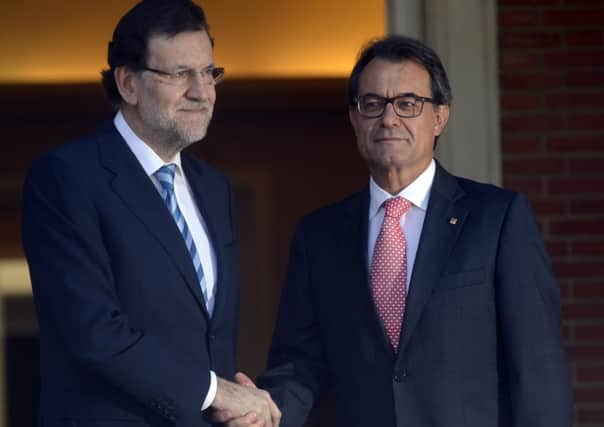Catalan leader pushes on with independence vote


After a two-and-a-half hour meeting with the prime minister, Mariano Rajoy, the Catalonian president Artur Mas said the referendum issue remained in deadlock. However, he said there was a willingness on both sides to keep communication channels open.
Mr Mas said the talks took place “in an atmosphere of frank dialogue”.
Advertisement
Hide AdAdvertisement
Hide Ad“That, in itself, is very positive,” he said. “There are always potential solutions,” he said.
A Spanish government statement said Mr Rajoy had reiterated to Mr Mas that the planned 9 November referendum was illegal and would be blocked. Mr Rajoy said the most important thing now for all of Spain, Catalonia included, was to consolidate the recovery from a severe economic crisis precipitated in 2008, according to the statement. Unemployment remains at 25 per cent.
The independence campaign holds profound consequences for Spain as it emerges from a double-dip recession, with Catalonia a key source of growth.
Mr Mas said he also presented Mr Rajoy with 23 economic and social issues that affected the daily lives of Catalans. He said that, among other things, he asked Mr Rajoy to reconsider government plans for cutbacks in funding for social services and education reforms.
Those issues could open the way for Mr Rajoy to make political concessions to the Catalans without granting an independence referendum.
The closed-door talks at the Moncloa Palace in Madrid came after months of clamour by political parties and business groups for the two to sit down to try to come up with a roadmap to prevent the dispute boiling over. But there had been little expectation of any major breakthrough.
Pro-independence sentiment in Catalonia has grown greatly in recent years, fuelled by a sense that the region deserves better treatment from Madrid. The surge stems from June 2010 when the Constitutional Court struck down key parts of a groundbreaking charter that would have granted Catalonia more autonomy and recognised it as a nation within Spain.
In the proposed referendum, the regional government wants to ask voters if they want Catalonia to be a state and, if so, should it be independent. Polls show that while a strong majority of Catalonia’s 7.5 million residents want the ballot, only around half favour severing ties.
Advertisement
Hide AdAdvertisement
Hide AdMPs in Madrid, who overwhelmingly reject the referendum, argue that Catalonians alone cannot decide something that affects all of Spain.
The referendum has stirred debate about whether the 1978 constitution should be reformed to devolve more power to Spain’s 17 regions and calm territorial unease.
An opinion poll published yesterday by the newspaper El Pais showed 62 per cent of Spaniards favoured Mr Rajoy negotiating a reform of the constitution that would satisfy Catalonia in exchange for Mr Mas halting the referendum. The survey by private firm Metroscopia questioned 600 people and had a margin of error of 4.1 per cent.
Catalonia is fiercely proud of its language and distinct cultural traditions. Many of its people are convinced that independence would benefit them economically.
However, both the European Union and Nato have warned such a new state would have to reapply for membership, a scenario similarly presented to the Scottish people ahead of the 18 September independence vote.